Essay | Antiquity
 For many of us, the music we used to like is the key to perfect shame. It represents our earlier, more naive and impressionable selves. Sometimes I try and justify my old tastes in the echo chamber of my head: "It was a simpler time! It worked for me back then! I didn't know what else was out there!" Ideally, we would like to feel that we've had refined and discerning tastes since the 6th grade.
For many of us, the music we used to like is the key to perfect shame. It represents our earlier, more naive and impressionable selves. Sometimes I try and justify my old tastes in the echo chamber of my head: "It was a simpler time! It worked for me back then! I didn't know what else was out there!" Ideally, we would like to feel that we've had refined and discerning tastes since the 6th grade.
Unless, of course, you're one of those people who simply likes what they like, without shame or apology, and doesn't understand the meaning of "guilty pleasure." If you are that person? Congratulations. You are a golden paragon of peace and tolerance, the kind of All-God we seek to emulate. I wonder what it's like.
I came upon the idea to dig up my old CDs and give them a listen with fresh ears. I wanted the ones that meant something to me while I fell asleep with a Sony Discman under my pillow. Mostly, I wondered: How could I have loved this stuff? Which is the heart of it all. At one point, I did love this, but it decayed over time. The implications of this go beyond music: How long will we love anything?
Obviously this isn't the time to conflate minor thoughts into big life strife. As a dude who likes to type about music, it might be fun to listen to the old things with a more discerning mind.
Layman Observations of Major League Soccer

- It is hard to tell which goalie is one what team.
I Watched The Wire
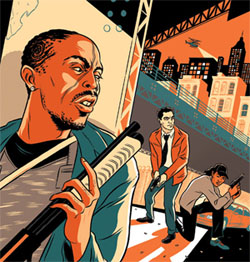 Credit: Mickey DuzyjLate to the party, so that the party is all mine.
Credit: Mickey DuzyjLate to the party, so that the party is all mine.
I guess I could simply say The Wire is great, that the tension was so well crafted, that nothing on television has ever felt so real and that so much of it hangs over your head long after you finish watching. It paints this extremely detailed, heart-wrenching, terrifying and incisive picture of an American city where everything is connected and everyone is doing their best to get by with varying degrees of morality. But everyone is also reacting and doing things they don't want to because of things they can't control, and you, as the audience member, are the only one with the omnipotent point of view that knows the real problems.
Except even knowing the real problem doesn't mean you have the real solution. Everything is so wrapped up together and fucked up and inescapable that it feels like this slow lurching towards doom is the only place this story can go, with very little exception and wiggle room. I guess that's what gets you the most: It feels like the real world, and the real world is such a fucked up place with small victories and bigger losses. Nothing ever really gets resolved, no one really wins. Situations change, and those come with new baggage that will continue to compromise and cripple any and all hope.
But if you've even heard of The Wire, you've probably already read all kinds of ranting and ravings about how amazing and powerful and important the show was. I don't have anything new to add except an agreeing nod, a subdued "Yep." It is probably the greatest show I've seen so far. But I was particularly interested in its depictions of criminals and criminality.
Well I Was Gonna Blog About Other Shit But

Case in point: I've been thinking on the killing of Osama Bin Laden, announced only 6 hours ago, and the reaction that it has been getting; in the media, in the crowds, on twitter and among my friends. Having ruminated on it for not-long-enough, here is what I've gleaned about the world.
My PA Days
Making good money in the creative arts is an intimidating Everest of a goal. It's designed to keep people who aren't serious about the work and discipline away. All of us like to say that we know this, and that we're going to be one of the few that stick it out until we get to the top. But every day, we start to see why everyone keeps jumping ship.
I'm not yet giving up on the dream, as I don't think I've encountered nearly enough difficulties to really break my back, but I have learned that saying is easier than doing. The foremost example in my life is the time I tried to be a production assistant. I got it in my head to be a writer for TV and film, because I lived in this area anyway, and the prize (while the odds of reaching it were slim) was more rewarding than my other career goal of novelist. But the path to writer is through writer's assistant, which is accessed via production assistant.
Production assistant is the term for entry level, all-purpose set hand. Here's how you know you're a competent PA: No one notices you. As a PA, you can only make things worse. On your best day, the show business machine continues on as it is supposed to. You facilitate its regular action, and the only difference you can make is when you screw up.
Radio Heroes
 There is something intimate about a voice on a mic. I would be talking about radio, but in the changing times as traditional AM/FM dies out, I'm more and more talking about podcasting. These days, I get all my perception-piercing microphoned voices from podcasts; This American Life, The Moth and especially WTF with Marc Maron.
There is something intimate about a voice on a mic. I would be talking about radio, but in the changing times as traditional AM/FM dies out, I'm more and more talking about podcasting. These days, I get all my perception-piercing microphoned voices from podcasts; This American Life, The Moth and especially WTF with Marc Maron.
Undoubtedly, Marc Maron has been an influence on my life and mindset as of late. But when I first started listening to talk radio, I was deeply into the anger and rantings of Adam Carolla's run on Loveline. Today, they both produce highly popular podcasts, and something weird happened: They did guest spots on each other's shows. It was a crossroads of two influences on my life. To be dramatic: a conversation between who I used to be, and who I am now.
I got into Loveline in high school. As an impressionable, depressed adolescent with no friends, I took to listening to radio late at night on my CD player. I would make sure to be in bed by 10 PM to catch Loveline so I could lie in the dark with my headphones on, and listen to Adam Carolla & Dr. Drew try and solve everyone's problems. It was usually hilarious, and occasionally tragic. Ultimately, I would laugh myself to sleep.
Video | The Shape of the Philippines
Shots from the plane as we land in Manila. Song: Bright Eyes - "Ladder Song"
Work
I worked in the rain this weekend. My unpaid internship starts to feel more and more unpaid as the days goes go by and, four months in, I really needed to stay afloat. So I started looking for jobs that could subsidize my thrice weekly LA trips, preferably on the weekends. With a little luck, I landed an usher job at a nearby outdoor stadium. Its got nothing to do with my hopes and dreams and I am surely overqualified. But these are the things we do to stay afloat.
Of course, I wasn't about to go hating myself and my job. I reserved that black part of my heart for retail. At the very least, in this position, I wasn't tricking anyone into buying things they didn't need. I wasn't pressured to hit certain sales numbers by any means necessary. And, all things considered, I was pretty lucky to have any meager amount of money. It is about time that I get out of the well of self-pity and join the rest of the world.
I Watched Blue Valentine
 Credit: artofthetitle.comI don't know why I keep gravitating to sad things. It's obnoxious, but it's a comfortable place. I like the sad song, the sad book, the sad people and even sad dogs. So it shouldn't be surprising that after hearing the initial buzz and rumbling, I was looking forward to watching Blue Valentine.
Credit: artofthetitle.comI don't know why I keep gravitating to sad things. It's obnoxious, but it's a comfortable place. I like the sad song, the sad book, the sad people and even sad dogs. So it shouldn't be surprising that after hearing the initial buzz and rumbling, I was looking forward to watching Blue Valentine.
On paper, it sounds too pedestrian and run of the mill. Two people fall in love but then they aren't, and they live in a city, and they're young and dress well, and then they become not-as-young and dress in awful bald eagle pullovers. If you read a synopsis or a summary, you would think, hasn't this movie been made already? Likely. But I don't know if its been made this well.
In our modern world, films about love have become the territory of Nicholas Sparks, where someone has a terrible illness and someone loves that person and then one (or both) of them die. It's a jack-in-the-box of feelings. You turn the crank in one direction, over and over, of course you get the desired emotional response: Jack springs out.
Blue Valentine doesn't need any of the fancy dressings of sailing scholarships and Alzheimer's disease. Patton Oswalt called it "a movie for fucking adults"and not just because it bounced back and forth between an NC-17 and an R rating. This is a film that goes to great lengths to capture reality, and just like reality, it doesn't sit well with you at all. There aren't extreme world-ending stakes or star-crossed lovers, but the way the details of their misery have been presented makes them feel just as heavy.
Dwayne McDuffie
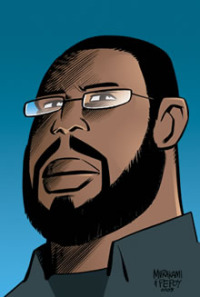 On Monday, comics writer and animated television producer Dwayne McDuffie died unexpectedly, of complications after emergency heart surgery. He is most well known in mainstream American pop culture as one of the co-creators of Static Shock, co-founder of Milestone Media, and producer/writer of the Justice League and Ben 10 cartoons. But to describe the man simply by what work he leaves behind is only part of what made him great.
On Monday, comics writer and animated television producer Dwayne McDuffie died unexpectedly, of complications after emergency heart surgery. He is most well known in mainstream American pop culture as one of the co-creators of Static Shock, co-founder of Milestone Media, and producer/writer of the Justice League and Ben 10 cartoons. But to describe the man simply by what work he leaves behind is only part of what made him great.
There have probably been hundreds of blog eulogies, of all sizes, since Monday. I don't have the ultimate one, or even a definitive, all-encompassing one to offer to the big RSS feed in the sky. I just have a few words that keep coming up in my head about what his work and philosophy meant to me, and how it profoundly shaped my creative goals. I can't claim to be the biggest Dwayne McDuffie fan. I haven't read many of his notable works, and my mind isn't full of McDuffie trivia. But for a while, I wanted to be a Dwayne McDuffie.
McDuffie, to me, was an activist in pop culture. He understood the nuances of racial politics, of inclusiveness versus tokenism, and on top of all that, he was a damn good writer. With other comics creators of color, he helped found Milestone Media, a publisher that had the most diverse comic books of the 1990s, as well as some of the best written. He had the talent, willpower and know-how to do what a lot of struggling, claustrophobic artists of color wished they could: Start their own company, do things their way, and be a success.
For those that don't dabble in the artistic communities of ethnic groups, there are piles and piles of starving artists trying to make it on their own, and have been for a very long time. They have their own labels, produce their own music, make their own films, fund their own projects. And a lot of them, for whatever reason, either never grow beyond the insular community that bred them, or fall by the wayside. Very rarely do they ever "break out" into mainstream success. It can be disheartening, as an artist of color, to believe that making work about your ethnic community can be a damning hindrance to your wider aspirations.
Review | You're Not Alone In Trying To Be
 Conor Oberst has been a huge musical presence in my life for the last 7 years now. Whether it was with his main outfit Bright Eyes, or his solo project with the Mystic Valley Band or his supergroup Monsters of Folk, I have always had his emotive, jangly voice lingering in my mind. Seven years doesn't sound like a big deal until I consider that nothing else-- No book or film or show -- has stayed so consistently part of my tastes. It's strange, and a little scary, to think that one prolific artist has become such an impression in my mind.
Conor Oberst has been a huge musical presence in my life for the last 7 years now. Whether it was with his main outfit Bright Eyes, or his solo project with the Mystic Valley Band or his supergroup Monsters of Folk, I have always had his emotive, jangly voice lingering in my mind. Seven years doesn't sound like a big deal until I consider that nothing else-- No book or film or show -- has stayed so consistently part of my tastes. It's strange, and a little scary, to think that one prolific artist has become such an impression in my mind.
The People's Key is, possibly, the last Bright Eyes album. If it is, it's an end of an era, although I'm sure that Oberst will still be churning out songs in one band or another. It may not have the same aesthetic or goal, but it will come from a similar place. I looked forward to this album with the high hopes that it would be a culmination of everything Bright Eyes that swept old and new fans along for the ride.
I don't know if it does that, or even if it should. What's sure is that there isn't really an air of finality to this album, unless you put it there yourself. I like it and will listen to it until smoke comes out of my iPod, but that's already a given. Mostly, it's noted for moving away from the folksy/country/americana roots style that they had been playing up (to tremendous success) since I'm Wide Awake It's Morning. You'll find much less honky tonk organs and slide guitar crooning in the background. Instead, we're given a sound that's a little more new age yet also a little bit thrashing. Hard guitar and attempts at synth characterize the album's standouts.
If Cassadaga was the natural evolution of I'm Wide Awake It's Morning, then The People's Key comes from an alternate universe where Digital Ash in a Digital Urn was the hit album of the duo that got everyone's attention. It evolves the basic electronic sounds of Digital Ash, mixes it in with a lot of rock and roll, and wraps them around the Bright Eyes base of maximalist confessions.
Story About Rats
 From 2006 to 2008, I lived in an apartment across the street from my college. It was my first real "independent" living experience, being out of a dormitory or my parent's home. I paid my bills, assembled my furniture, and solved my problems.
From 2006 to 2008, I lived in an apartment across the street from my college. It was my first real "independent" living experience, being out of a dormitory or my parent's home. I paid my bills, assembled my furniture, and solved my problems.
A few of these problems were worse than others. In fact, some of these problems were alive, red-eyed and terrifying just a shadowy presence. My roommate and I found out, in our last year there, that we had been living with a small rat army.
Stranded
I mean, I need and desire and gobble gobble chomp it up like a hungry hippo, but I hate it.
Since I was a small child, I've had weird hang-ups about money and spending, and as a result, I am pretty frugal and generally smart with how I save and spend. But it stresses me out from end to end. I go to sleep worried about money, I have bad dreams and great nightmares, and I wake up worried about money. It's not even that my family is dancing with poverty, or that my personal checking account is particularly empty. In college, I couldn't deal with having less than two hundred dollars. Today, I can't deal with having less than a thousand.
If you're part of the sane majority, that sounds like a luxurious amount of money to have stored away at this age, I know. I know I should be amazed that I manage to have that much after all this unemployment, which I can't seem to scrape off my failing person. But this mind can't be beat down with blunt logic. It is one of My Things. I stress and feel shitty and I wonder when will I be able to find some steady, reasonable income to be both independent and comfortable.
Essay | Nuances of Political Correctness
Political correctness gets a lot of shit. There's the idea that it's purely censorship, that it's oppressive to language, that everyone is just too fussy and oversensitive. We've defined it with a negative stigma so that we can condescend to anyone's protest about offensive material by labeling it as just another attack from the PC thought police.
Comedian Stewart Lee does a great bit about political correctness that dares go against popular opinion: "It's an often clumsy negotiation towards a formally inclusive language," says Lee. "There's all sorts of problems with it, but it's better than what we had before."
That's about as level headed as the discourse on the nuances of political correctness gets. The problem with most of the discourse on PC is that it is seen in the context of a battle, with wins and losses and very tangible goals. A watchdog group speaks out in protest against an insensitive remark in the media, and then that target attacks back, and they try and take away other's legitimacy/career.
The problem with that rhetoric is that it forgets that this is a cultural conversation, not a gladiator arena. There is not going to be a winner and a loser, nor should we be aiming for such. While there may be short term accomplishments (Dr. Laura loses sponsors for racist remarks on the radio) what they're really talking about (the use of the N-word) isn't resolved. The point of having watchdog groups raise their voice, and even the point of people attacking those watchdog groups, is for the rest of the world to gain access to this conversation and make adjustments to their lives if they see fit. This is how culture evolves.
Balikbayan, pt. 4: Epilogue

Three years is a long time by most standards. For life milestones and other significant events, it almost seems too soon. When I came to the Philippines for the first time as an adult in 2007, I found it to be a significant and confusing experience. It was awe inspiring at times, depressing at others, and generally lonely. I left motivated with new knowledge and life experience that would fuel my years to come. I did not expect to come back again so "soon."
On the last day of November, my grandfather passed away at the age of 92. My parents packed their things to be with the family in early December, and my Sister and I followed on our own a week later. His name was Nestor. I did not know this basic fact until I came here. Everyone referred to him by his second first name, Virgilio, but legally his real first name was Nestor. How do I go for 23 years without knowing that? I never got to know him on a personal level. I knew and admired him mostly by reputation.
At Long Last
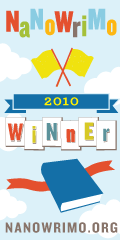
I discovered NaNoWriMo in 2007 and jumped right in, then immediately jumped right out. I hovered somewhere around 17,000 words written before I realized I didn't know what the hell I was doing. Sure, I was writing a screenplay and revising several pieces at that time, but NaNoWriMo is a cold, deaf master. It is about discipline, not excuses.
I tried again once every year after that. I failed around 16,000 in 2008 because of PCN preparations. I died around 20,000 in 2009 because I started my new job that month. I decided that this year, at long last, was going to be different. I was motivated to not be shamed for a 4th year in a row, and to prove to my inner critic that I could do it. Except I started my internship that month, so that wasn't conducive to a good writing schedule.
But again: it's about discipline, not excuses. There will never be a good time to sit down and write 1,600 words a day. Something will always come up, and it will feel like an incredible hurdle. So, just past midnight of Halloween night, I put my fingers to typing something incredibly depressing and ridiculous. I won't say what the story is about; It is pretty shamelessly over the top in its darkness and negativity. I will say that it had a lot of legs, but it was so horrible that I couldn't help but laugh when all the datums in my head plugged together and came up with that harrowing spark. It is one thing to come up with an idea. It is another to come up with an idea that makes you laugh because, really, your brain can't be serious.
Review | Cast Aside His Starving Eyes
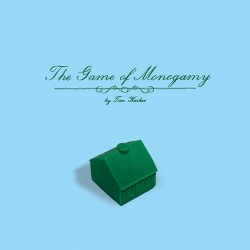
Sometimes, I worry about Tim Kasher. I know that's a completely ludicrous, arrogant feeling to have. It presumes that I, as an avid but distant fan, know what's going on in the private life and mind of an artist through his art. Conor Oberst never had a younger brother that died in a bathtub and Will Sheff is, in all likelihood, not a woman cheating on her husband on an island off the coast of Maine. It's common for artists to invent a fiction of a situation to channel emotional truth. Yet, for some reason, Kasher has always seemed like the most earnest and fiction-less songwriter I have known, for better or for worse.
This all started for me with the song, "Art is Hard." It was one of my first exposures to the band, and the fact that it was so self-aware and self-referential colored a lot of my early impression of the band. Here was a guy singing about songs. In the lyrics, the speaker laments the lack of emotional turmoil to milk for profit and song. In fact, the highest form of turmoil he has is, in fact, that very situation: passing the hat around and making money off of his misery. "Everything I hide ends up in lyrics," sings Kasher. Who are we to doubt his authenticity when he baldly addresses it?
No Way Out But Through

In my last year of college, I got to use the ropes course. The ropes course was this walled-off section next to our gym with ziplines, wooden poles, a twisting rock wall, and various hanging ropes to swing from. Normally, you had to pay and make an appointment to use the course, because it required equipment and wavers and supervision. But I happened to walk by during a sort of "open house" for the course, so some friends and I jumped in on impulse.
I have always been afraid of heights. I look down from the second story of the mall, get sick, and step away. I think heights were the very first thing that I ever identified as a fear, which is important, because the things we are scared of are just as integral to our personalities as the hobbies we keep and the things we like.
Anything higher than a full flight of stairs induced vertigo, yet somehow, this ropes course was exciting. I didn't hesitate to get in a harness and sign whatever form that said if I broke my face it would be my own damn fault.
That's not my natural reaction to fear, but I keep trying to duplicate that anyway in other aspects of my life, wherever appropriate. This isn't some chest-puffing, bravery braggadocio - I am still very much afraid of everything. I still hate heights. But I still go up there, anyway, because as much as I hate heights, I hate being afraid more.
One of the obstacles there is essentially a wooden pole, about 35 feet tall, with a perch no bigger than a diving board at the very top. Maybe 7 more feet in front of that tiny platform is a small trapeze bar. You climb it, and all the while, a supervisor is holding the other end of a pulley contraption locked into your harness. The objective is simple: jump. From this precarious standing position, jump forward, reach out, grab the bar and hold on. Or fall, for a few terrifying moments, before the rope is drawn taut and you hang in shame.
Essay | Days of Music
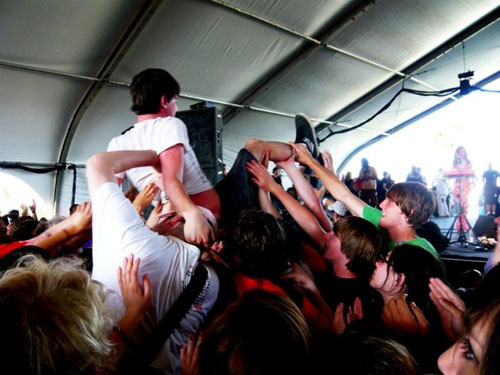
Shocking confession: My life isn't all too exciting right now. The best way I can describe it is a series of ellipses punctuated by an exclamation mark, and this pattern repeats until I start moving towards a career. All of that is to say in an unnecessarily abstract way: I do a lot of nothing, and then something, and then nothing.
I will spend three weeks applying for jobs with no bites. Then I will take a trip to Washington. I will spend three weeks staying indoors, forgetting what air smells like. Then I will work on a film set for 10 days. Then I will spend three weeks just to observe my mental and physical atrophy. Then I will attend three bad-ass concerts within 10 days of each other. HERE IS A BLOG ABOUT THAT LAST PART HOW ABOUT THAT SEGUE
